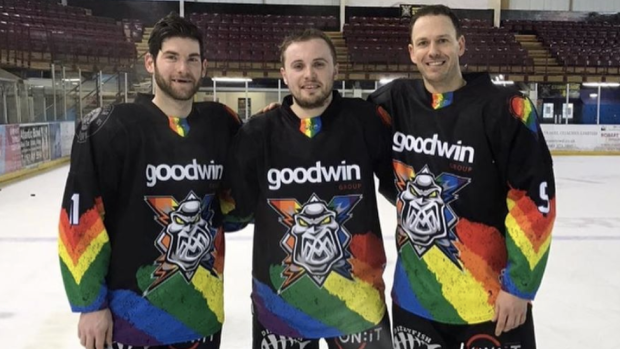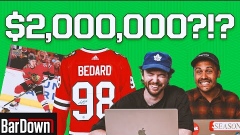I love hockey, but just because I love the sport doesn't mean I think it's perfect. This past month alone, there have been countless moments where I've thought to myself, it's difficult to be a hockey fan right now.
On one hand, the sport will always have a special place in my heart because of how much I enjoy it and everything it's taught me as a person.
Hockey has always been a sport rooted in tradition, but it's also seen by a lot of people as a sport that's not very inclusive and accepting. Everyone who has ever played hockey or gone to a game or simply just plays NHL 20 knows some of the things players and fans say on the ice, at games, or on social media. Some of those things are the exact opposite of what this month stands for, inclusivity.
Back in January, Zach Sullivan of the Manchester Monarchs became the first active professional hockey player to come out as bisexual. Knowing what we know about hockey culture and its community, if we as a community don't change, then it would be hard to see a professional player in North America feeling comfortable enough to do the same thing as Zach. But take it from Zach, who spoke to me about how accepting the hockey culture is in England and what we can do as a community to make our sport for everyone.
Luca Celebre: 5 months ago, you came out as bisexual on Twitter and became the first active professional hockey player to come out. What went into that decision to come out publicly?
Zach Sullivan: I think it was a few things. I think the biggest thing for me was when I was in my early teen years, I was struggling with my sexuality. I think that it would have been a lot easier for me if there was an active hockey player who was bisexual. The other main goal of all of this is to try and help anyone going through the same situation, similar journeys. I think that was the main reason behind it. I think the majority of my teammates knew before I tweeted. I had been dating a guy for about two months from Manchester. It’s kind of a cliche but it was just to free myself. Obviously I don’t think there was anything to hide, but I could be honest with my teammates, I wasn’t hiding anything from them. I think that’s another big reason why I did it.
LC: Did you feel that weight just kinda lift off your shoulders when you did finally hit send and talk to your teammates about it?
ZS: I told my teammates the night before. We had a game on Saturday and then I told them after the game that I was going to tweet the next day. I was a little worried about how the reaction would be from the wider kinda field from the opposition teams and the fans, but straight away, it sounds a bit cheesy and kind of cliche again, but it was like a weight being lifted off my shoulders like you said. When I got to the rink and the reaction from the fans and the other teams, the majority of the reaction from my Twitter and Instagram was overwhelmingly positive. It was just very freeing.
LC: Were you nervous at all to talk to your team the night before?
ZS: Yeah. So the first teammate I told I was dropping him off at the airport to meet his family and I kinda told him I’ve got a date on Monday. He was like where did you meet her, did you meet her off this, did you meet her off that and I was like it’s a guy. He was like, oh, okay cool. It wasn’t what I built up in my head. I kinda built up the reactions were going to be negative. Pretty much every response was the same, ok that’s fine you do you and as long as you’re happy, we’re happy for you. I was very fortunate to have a bunch of teammates that were so free thinking and so open minded and my friends and family obviously supported me all the way through as well so I was very fortunate in my situation.
LC: Hockey can be viewed as this sport that’s entrenched in tradition and sometimes maybe some people might say ignorant in terms of how hockey players come off and are maybe not as accepting as other sports or athletes. Have you found that to be the case whether it was before you made the decision to come out or afterwards?
ZS: This is the first time Im going to say this but I did have a homophobic slur aimed at me in December. A couple of my teammates knew that I was bisexual and obviously the opposing player had absolutely no idea and not excusing what he said at all, but it wasn’t a personal attack, it was just an insult. The kind of reaction from my teammates was we’re hockey players, we’ll fight him next game. I was kinda like I don’t want this to be a big deal. Since I’ve come out and tweeted about it, nobody has said anything. If anything, people have been coming up to me, guys that I don’t know personally and said what you’ve done is really good. Like you said, hockey gets tarnished with being and old boys club. It’s not very accepting of new ways or new people and different people. I think that might have been a blessing for me having done it in the UK. Hockey is nowhere near as big as it is in North America. I think we don’t have as much tradition and we’re more accepting of those new ideas and different people. I think doing it in the UK was slightly easier. I got asked why I didn’t think soccer players over here have done it and that’s kind of a similar level as ice hockey in North America and some of the abuse that footballers are attacked with. Racism is still a huge problem in football. Black Lives Matter movements and Equal Rights movements have been going on a lot longer than LGBTQ movements, so I think there’s still a long way to go as far as that’s concerned.
LC: I was going to ask, we see in the NHL they are pushing the message Hockey is for Everyone. Obviously we’d like to think that hockey is for everyone, but in some cases it doesn’t seem like it is. Do you think Hockey Is For Everyone and that we’re trending in the right direction?
ZS: I think we’re definitely heading in the right direction. The NHL does their Pride Day and they don’t have to do that. They don’t have to involve themselves. I think that mental health is another part of the world that hockey is leading in. We talk about it freely and mental health isn’t seen as a negative thing. It’s seen as something to talk about and help people through. I think hockey is leading the way for most sports. Obviously female sports are doing a much better job than the male sports, but I think ice hockey is leading the way in a lot of things and mental health and inclusion are two of the biggest things. I don’t know the North American hockey culture as much as you guys, but definitely over here it’s very accepting and we celebrate people’s differences which I think is a good thing.
LC: As much as we are North America and you’re over there (in the UK), the hockey community is all one and a question I’ve been kind of wondering personally as well is how can we as a community live up to that statement that hockey is for everyone? Is there something that comes to mind when you think of what the next steps you want to see are?
ZS: I’m not sure if hockey does it, but the Rainbow Laces movement in the English Premier League is obviously a big thing. It’s making a lot of difference. I think movements like that where our differences are celebrated rather than we’re being singled out because we’re different.
LC: Now, this Pride Month is your first since publicly coming out on Twitter. What does this month mean to you now that you are out?
ZS: Well it’s been a strange first month because we’re still in lockdown in the UK. There haven't been any marches or parades I can go to. Being able to talk about this thing, I’m quite a private person. I think talking about your sexuality regardless of your orientation is a very private matter, but being able to talk freely about it and hopefully help other people through similar situations, it makes me feel good. Like I said, when I was 16, I would have really liked to have a role model who was playing and while I’m not the perfect role model, I can still try and help people through their journeys. I think it’s an honour and a privilege to be involved in anyone else’s journey regardless of how big or small a part you play in it.
LC: As a hockey community, how can we push forward this conversation that Hockey is for Everyone and be this inclusive sport that we all want to see?
ZS: I think hockey is guilty of putting the team first before individual health. We’ve seen that change with mental health and I think if it goes along the same lines as how we now treat mental health in the hockey world, I think it’s making huge strides to become more inclusive. I think just being able to talk about things freely is a big thing. Like you said, hockey is tarnished with a stigma. From my personal experiences, I don’t believe there is a stigma, but it definitely came into account when I was thinking about my sexuality and whether I would come out and I think just being able to talk about that freely. I know that there’s a problem with homophobic slurs being used and it does seriously affect that person that it’s being said to. When I was younger, there was a rumour spread about me that I was gay and it spread through the hockey world and it was 9 years ago now and it made me feel very alone because my friends at the time distanced themselves from me and it made me believe that stigma and I wasn’t able to talk to anyone freely about it and I think that’s the biggest thing that the hockey community can do, just talk about it. Talk about it as if it’s normal because until it’s treated as normal, it’s never going to be normal.
There are ways in which the hockey community is going beyond simply being welcoming. The You Can Play Project works to ensure the safety and inclusion for all who participate in sport, including LGBTQ+ athletes, coaches, and fans, and it's one of the initiatives the NHL and its players and staff support.
It goes beyond the league, though. It starts me. It starts with you. It starts with each and every one of us who loves hockey. Whether you play it or just watch it, we all have a responsibility to make everyone who loves the sport of hockey feel included and accepted for who they are.
It's not enough to just be welcoming anymore. We need to be allies to those who have been discriminated against. There's still a lot of work to be done and hopefully my conversation with Zach, or Zach's story in general, will promote more conversations like this so that we can mean the statement hockey is for everyone the next time we say it.




